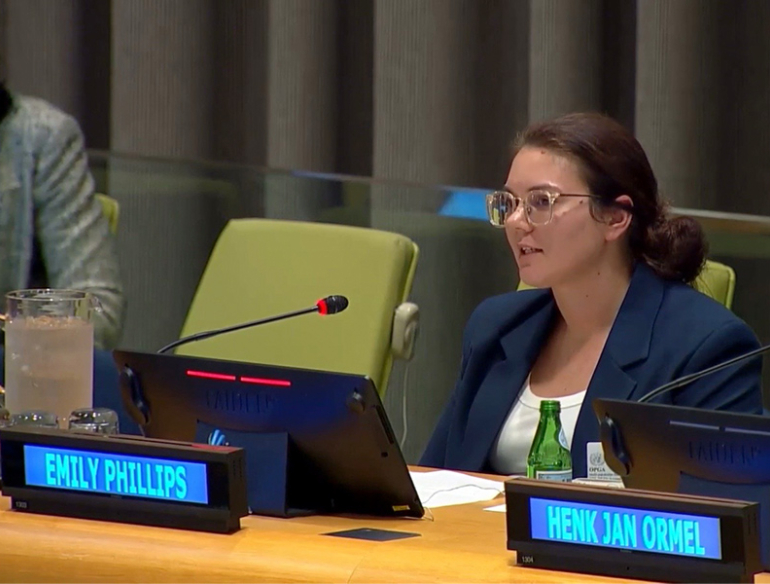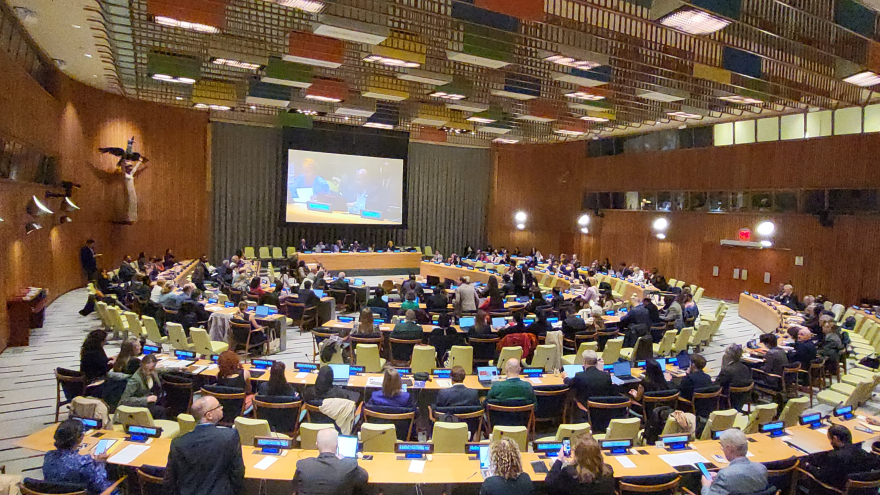Last month, Emily Phillips, Project Manager at the Kirby Institute, was invited as a panellist representing Indigenous people at the Multi-stakeholder Hearing on Antimicrobial Resistance (AMR), held at the United Nations (UN) Headquarters.
The hearing was convened as an opportunity for stakeholders from across the globe to contribute to the ongoing preparatory process for the third UN high-level meeting to address the global challenge of AMR, due to take place later in 2024.
Miss Phillips, who works across the Kirby Institute’s Aboriginal and Torres Strait Islander Health and Surveillance and Evaluation Research Programs, spoke on a panel about the effective governance, leadership, and coordination of the AMR response at national, regional and global levels.
Multi-stakeholder hearing on antimicrobial resistance at the United Nations headquarters, New York.
In her remarks, she reflected on the critical role of surveillance and information sharing, and highlighted the positive outcomes that can be achieved when stakeholders from vulnerable populations are included in the design, development, implementation and evaluation of health strategies:
“Vulnerable populations should be the ones deciding how we manage and respond to public health issues, from what policies are needed to guiding technology and drug development and what that looks like when it's delivered to individual communities. We need to recognise that there will not be a one-size-fits-all approach and that community needs differ across regions and populations.”
She reflected on her expertise within Australia’s COVID-19 response for Aboriginal and Torres Strait Islander communities, who at the start of the pandemic were identified as a key risk group to the health impacts of the disease:
“From the beginning of the pandemic, we saw a genuine partnership between our Government and Indigenous Australians. The Government worked collaboratively with Indigenous communities, allowing us to have a voice and be decision-makers in all aspects of the COVID-19 pandemic.
“At a time where Indigenous populations around the world were more likely to contract COVID-19 and were dying at disproportionate rates to the general public, Indigenous Australians were six times less likely to contract COVID-19 compared to other Australians. In the first 18 months of the pandemic, there were no deaths among Indigenous Australians.”
Kirby Institute Director, Scientia Professor Anthony Kelleher, said: “Emily has demonstrated thoughtful and considered leadership in her work within the national First Nations Respiratory Point-of-Care testing program. She has been a valued and collaborative conduit between the many communities, government, academic, industry, and clinical stakeholders that have made the program such a success. She is demonstrating great skill in her role as an ambassador for the Kirby Institute, for First Nations people, and for Australia, and I thank her for her important contributions at the United Nations hearing.”
Of the experience speaking at the UN Headquarters, Miss Phillips says that it was an important opportunity to highlight the role of the world’s Indigenous peoples within the context of present and future global health challenges.
“We know from our experience with COVID-19 that when given the opportunity, the people most impacted by health issues are best placed to lead the response. I am grateful for the opportunity to speak at the United Nations Headquarters on this important issue and I look forward to hearing about the ongoing discussions on the essential role of surveillance and information sharing, and of Indigenous peoples and other vulnerable populations in relation to AMR and global health challenges broadly.”

